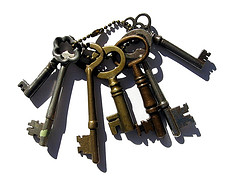
photo credit: “T”eresa
What happens when the pastor of a evangelical megachurch in Iowa commissions a mural from a lesbian artist from New York City?
Well? What do you think will happen? Is it a doomed binary between conservatism and liberalism? Is the scenario too contrived and limited to stereotypes? Does religion win? Or fail? Or both? Or does it sound like a bad joke?
Sometimes those are the questions that make for an unexpected date night for me and the husband so despite a blizzard warning set to go in effect around the second act we headed out to see Keys of the Kingdom (now playing at Stage Left Theatre in association with Theater Wit, Chicago, through February 15). If you’re local, you want to support the arts, you like proposing different endings or changes to plays/movies/books, and you have a little cash and time to spare this is one of those shows you might want to catch.
It’s not The Book of Mormon kind of laugh out loud irreverence (actually I am going on hearsay because we have not yet seen that musical) but I appreciated that playwright Penny Penniston thought enough of evangelicals and lesbians to create characters instead of caricatures. Ed, the evangelical megachurch pastor came across utterly sincere if not a little weird in his conviction and faith while being open to the possibility that God would ask him to do something that seemed outside of the rules of conservative behavior. Christians can be weird because some of the stuff we say and say we believe in and do in the name of beliefs can come across as weird. Irene was an artist who also happened to be a married lesbian. Her sexual identity and marriage are important to her personhood but are part of an integrated whole just like I am not “just” Asian American or a woman.
The evangelical v. the lesbian is what I would call low-lying fruit for misunderstandings, politicizing, and proselytizing; thankfully that was not what this play was about. I walked away appreciating that there were things Ed and Irene could not fully explain but believed in deeply enough that they were open to new possibilities, relationships, and risks. If only we could reproduce that in real life a thousand-fold. Imagine what could happen.
The story also touched on how even good intentions can fail miserably, and my mind automatically went to the missteps taken by fellow evangelicals and allies who echo Irene’s line and say, “I was trying to help.”
The response (and sometimes my response)? “That’s what a child says when they make a mess of things.”
In the myriad of misunderstandings, good intentions with bad results, and disagreements we agree will never be bridged but by a work of God, there is grace. I was thankful it made an appearance in this play. I’m hoping to make more room for it in my heart, my words, and my actions.
The play was a wee bit long for my taste, and you could hear noise through the walls (two other plays were running at the same time in this multi-stage theater. I would’ve changed the ending, shortened the play, and allowed for some time for the audience and the actors to interact because I kept wondering if Peter and I were the only evangelical Christians in the audience. What was everyone else thinking?

